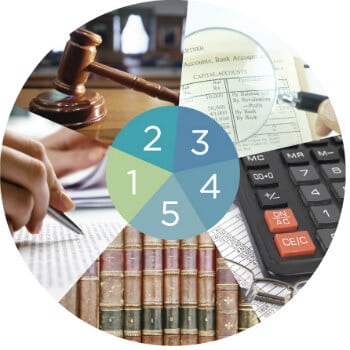 Above all, forensic accounting combines the auditing skill-set of a Certified Public Accountant with the investigative skills of a detective.
Above all, forensic accounting combines the auditing skill-set of a Certified Public Accountant with the investigative skills of a detective.
Typically, forensic accountants are employed by large public accounting firms and maintain their own internal division.
Similarly, their specialty lies in litigation support and fraud examination. As a result, government agencies, commercial corporations, and financial institutions are just some of the various clients who request the services of these certified fraud examiners.
Related: Learn how to become a forensic accountant
Above all, these “financial detectives” generally start out as traditional public accountants. Typically, this period usually lasts from 1-3 years.
Subsequently, they move on to more specialized departments where they’ll work for the bulk of their career.
Accounting Firms with Prominent Accounting Departments
- PwC
- Ernst & Young
- Deloitte
- KPMG
- Grant Thornton
- McGladrey
- BDO
- Plante Moran
- BKD
- Baker Tilly
- Rothstein Kass
- CohnReznick
- Dixon Hughes Goodman
- UHY Advisors
- Mazars
What Do Forensic Accountants Do?
The Full Breakdown
Accounting as a career has several specializations which include forensic accounting, public accounting, cost accounting, and tax accounting. Additionally, these specializations will usually require further qualification or certification.
One of the fastest-growing specializations is forensic accounting. This is probably as a result of the increase in money laundering, fraud, and other white-collar crimes, alongside a complementary increase in compliance requirements. Basically, it’s a mix of accounting practice, financial statements investigation, and auditing.
Consequently, forensic accountants use these three skills to carry out an examination into the financial records of a company. This examination is supposed to be complete and thorough enough to stand in court as evidence in legal proceedings. Furthermore, these professionals, also called an investigative or forensic auditor, may be called to testify in court as an expert witness. Hence, they will investigate fraud and other related matters.
Typically, companies seek the services of forensic accounting firms for litigation support, insurance claims, dispute resolution, and investigative accounting. Furthermore, the forensic accounting firms may also be hired during the process of mergers and acquisitions to carry out an in-depth look into the business valuation of each company.
The large accountancy firms will have a forensic accounting department. For example, the Big 4 accounting firms, Deloitte, PwC, Ernst & Young and KPMG all have forensic accounting departments. Additionally, another large accounting firm that has forensic accountants on staff is BDO International.
An Industry on the Rise
Forensic auditing isn’t just for large accounting firms. Even small firms have recognized the growth potential of this field.
Mattson Driscoll and Damico (MDD) is an example of a forensic accounting firm.
It’s an American company with offices in the following locations:
- United Kingdom
- Australia
- Singapore
- Canada
- United States
RGL Forensics is an international forensic accounting firm whose focus is solely on financial forensics. Additionally, Kessler International is a similar firm with headquarters in the United States. Michael Kessler founded this company: a man quite famously known as the first forensic auditor.
Essentially, A variety of organizations retain forensic accountants. Typically, these include the police, banks, insurance companies, government bodies, and law enforcement.
Furthermore, the notorious gangster Al Capone was prosecuted in a court of law and jailed with the help of a forensic accountant. Therefore, think of it as an up and coming profession. Ultimately, it’s a profession where you get to play detective: searching for embezzlement and other financial crimes committed against other people, the government, or specific companies.